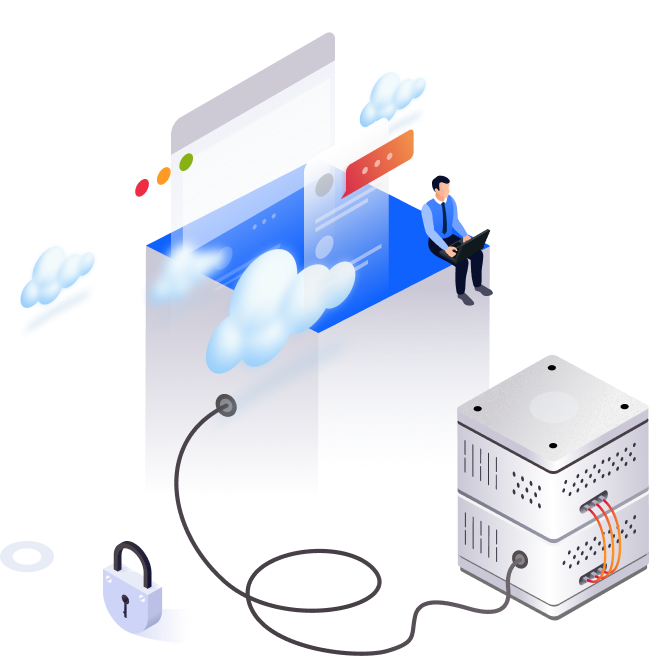Intuitive Control Panel
Easy-to-use dashboard for managing your VPS with one click
Powered by Ryzen processors with NVMe storage.
Choose your ideal location from our global data centers with real-time latency testing
VPS (Virtual Private Server) is a dedicated server created by partitioning a physical server into multiple isolated virtual servers using virtualization technology. It operates independently and has its own CPU, RAM, and storage resources. It allows users to install their own operating systems and run applications. Since VPS provides root access and high levels of customization, it is ideal for resource-intensive applications such as websites, application servers, and database management.

Everything you need to deploy, manage, and scale your virtual servers
Easy-to-use dashboard for managing your VPS with one click
Deploy Ubuntu, Debian, CentOS, Windows & more instantly
Create backups and restore your server state anytime
Track CPU, RAM, disk & network usage in real-time
Upgrade CPU, RAM & storage without downtime
Experience the power of enterprise-grade infrastructure at affordable prices
Get your VPS server ready in less than 5 minutes with our automated deployment system.
Advanced DDoS protection keeps your server online and secure from attacks.
Lightning-fast NVMe SSDs deliver up to 5x faster performance than traditional drives.
Our technical support team is available around the clock to assist you with any issues.
Automatic daily backups ensure your data is always safe and recoverable.
Complete control over your server with full root access and custom configurations.
A VPS is a service created by virtually partitioning a physical server into multiple independent sections. Each user can manage their own operating system and allocated resources independently.
VPS offers users exceptional customization and control capabilities, making it ideal for medium-sized projects and applications with high resource requirements.
VPS usage stands out as a reliable and effective solution because it offers more security and performance compared to shared hosting solutions. While functioning like a physical server, the sharing of resources among multiple customers reduces costs.


Rabisu offers a variety of VPS packages featuring powerful AMD RYZEN processors. Below are the starting prices:
All packages include unlimited traffic. Choose the most suitable option for your needs.
We truly believe that having a stable network core is one of the main building blocks to offering a fantastic service to our clients. Rabisu has invested heavily in ensuring we have the right hardware & software to facilitate this.
All of our network switches & devices are connected to at least 80Gbit of uplink capacity.
Our network is designed to automatically failover to backup hardware & network transit in the event of an outage.
We offer 100Gbit+ of DDoS Protection, providing our customers with the best in class solution against malicious attacks.
We strive to offer services that are online at all times, we back this up with a 99.9% SLA backed guarantee.
Verified feedback from Google, Trustpilot, and Facebook
See how Rabisu compares with other leading cloud providers
|
|
Provider X
|
Provider Y
|
Provider Z
|
Provider W
|
|
|---|---|---|---|---|---|
| Price | $2.99/mo | $48/mo | $48/mo | $48/mo | €35.52/mo |
| RAM | 4 GB | 4 GB | 4 GB | 4 GB | 4 GB |
| CPU Cores | 2 | 2 | 2 | 2 | 2 |
| NVMe SSD Disk Space | 80 GB | 80 GB | 80 GB | 80 GB | 40 GB |
| Bandwidth | 4 TB | 4 TB | 4 TB | 4 TB | 20 TB |
| DDoS Protection | |||||
| High Frequency CPU's on all plans | |||||
| Free Daily Backups | |||||
| Order Now |
Everything you need to know about our VPS hosting
VPS (Virtual Private Server) is a dedicated server created by partitioning a physical server into multiple isolated virtual servers using virtualization technology. Each VPS operates independently with its own CPU, RAM, and storage resources.
Yes! You can upgrade to any higher package within minutes without any data loss. The system calculates the price difference based on the remaining time of your service.
Yes, daily backups are included free of charge with all plans. We store your data in 2 backup points. However, this complimentary service does not guarantee full data recovery.
We provide a 1Gbps-10Gbps Shared Port for all VPS servers. To ensure all virtual servers receive consistent performance, we apply a Burst vs. Sustained model:
Burst: You have full access to 1Gbps for standard operations (web traffic, updates, backups).
Sustained: If your bandwidth usage averages more than 100Mbps over a 6-hour window, your port speed may be temporarily managed to protect the node's backbone stability. This ensures 99% of our users always have a "lag-free" experience while preventing 24/7 mass-streaming or seeding from degrading the network.
VPS orders are delivered within 5 minutes with the operating system and control panel installed automatically. The delivery time may extend up to 24 hours due to potential infrastructure issues.
We support a wide range of operating systems including Windows Server, Ubuntu, Debian, CentOS, Rocky Linux, AlmaLinux, and Fedora. You can also upload custom ISO images.
Yes, all VPS plans include advanced DDoS protection to keep your server online and secure from attacks at no additional cost.
Yes! All our VPS plans come with full root access (Linux) or administrator access (Windows). This gives you the freedom to install any software, modify system settings, and have complete control over your server.
Join thousands of satisfied customers and experience the power of our VPS hosting today.
Choose your plan and get online in minutes!
99.99% Uptime SLA • 24/7 Expert Support • Money-Back Guarantee